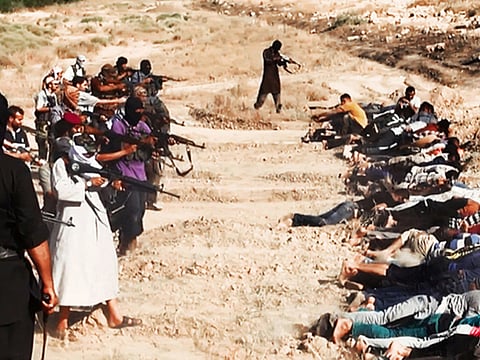The sectarian collision course
What is relevant today is the way major powers act to rule the Arab world, not just control its fate

In the aftermath of the Arab uprisings that unleashed the quest for freedom, governments scrambled to limit sectarian divisions, though much of these efforts came to naught. Regrettably, weak governments fell into carefully laid out traps, which aimed to divide and rule. Much of those exertions succeeded, including protracted wars that further destroyed Arab wealth and cohesiveness, while members of the majority Sunni communities saw their power bases marginalised. It was a given, and on cue, that extremist movements like Daesh (the so-called Islamic State of Iraq and the Levant) would rise, which promise to further polarise the Arab and Muslim Worlds.
How to prevent Daesh from gaining power in both Iraq and Syria, or to make a bid for Lebanon, or to even make inroads in such places as Yemen, Libya and elsewhere, are serious questions that can no longer be neglected. It is vital to ask what regional governments will need to do to prevent Sunnis from joining the ranks of Daesh. Can Baghdad and Beirut stand up to pro-Iranian militias for example? Can the minority regime in Damascus impose its will over the majority that no longer wishes to be ruled by the Baath and do so with impunity? Will sectarian tensions increase at a time when confrontations polarise awakened Arab societies caught in the whirlwind of modernisation?
To be sure, such questions are neither easy to formulate nor answer, although an extraordinary recent book titled Istihdaf Ahl Al Sunna (Targeting Sunnis) by Nabeel Khalife, an established Lebanese-Christian thinker with numerous publications to his credit, offers erudite responses. Khalife advances the thesis that the post-2011 Sunni-Shiite struggle was carefully planned by leading western powers, including Russia, to preserve Israel and impose the latter’s acceptance in the Middle East as a natural element, even if it was not.
He offers sharp distinctions between Sunnism, which he asserts evolved its political roots before it justified dogmatic aspects, and Shiism, which he affirms developed its religiosity before it aligned political agendas. Based on an extensive discussion of the 1979 Iranian Revolution that toppled the Shah, Khalife advances the notion that the revolution was not “Islamic” but an “Iranian-Shiite” rebellion that ended the Pahlavi monarchy.
Khalife’s book mimics Samuel Huntington’s Clash of Civilisations, though it is far more honest, as it concentrates on how the world’s three monotheistic religions perceive each other and “Political Sunnism”. He divides the Christian world into three branches, Protestant (America), Catholic (Europe) and Orthodox (Russia), associated with a junior partner, Judaism and its Israeli Zionist corollary. The target of these communities, he avows, is the “middle world” (a famous Henry Kissinger appellation), which houses significant and indispensable oil resources that cannot possibly be entrusted to its natural owners because the latter harbour permanent and doctrinaire ideas that have little room for compromise. In other words, what makes “Political Sunnism” dangerous, according to Khalife, is its rigidity. That is why these same powers have concocted various policies to check the undeniable force, and while one does not have to believe in conspiracy theories, which Khalife does not, one is able to provide geo-strategic analyses that debunk facile journalist interpretations that confuse far more than they elucidate.
Kissinger, Khalife reports, once opined that whoever ruled over the “middle world” would rule the globe. His amply documented book, which ought to be translated into English so that a wider audience can benefit from its insights, affirms how the former American secretary of state plotted and behaved. As an astute historian, Kissinger was surely aware of what Arnold Joseph Toynbee — the author of the monumental 12-volume A Study of History — once wrote, namely that Islam — “Political Sunnism” — would return to write its own renewed chapter. Since Toynbee was a pro-Zionist figure, his affirmations are worth pondering, especially given his change of mind in the late 1940s when he recognised injustices committed against Palestinians. One of the most prescient analysts of contemporary Middle Eastern affairs, Toynbee feared that the creation of Israel and its subsequent behaviour would increase the risks for nuclear confrontation, which certainly encouraged Iran to plan for that option. Of course, what Toynbee and Kissinger dreaded was a nuclear confrontation between global powers, though the former’s appraisals and the latter’s decisions ensured the rise of junior local partners that aim to emulate Washington and Moscow.
What is relevant today, and what Khalife brilliantly explains in his latest study, is the way major powers act to rule the Arab World, not just control its fate. There seems to be agreement over key questions, ranging from a monopoly to determine whether the Palestinian Question can or ought to be resolved, whether the very notion of a strong Ummah can or ought to be rejected, and whether sectarian confrontations can or ought to be encouraged to give advantages to outsiders.
Naturally, World powers prefer the Westphalian nation-state system that, presumably, protects minorities who require shields from extremists. Yet, what will ultimately protect minorities, Shiites, Christians, Jews and others are the ideas, policies and initiatives adopted by emancipated Arabs from all faiths and denominations, originating in thinkers like Mohammad Arkun, Abul Hassan Bani Sadr, Tariq Ramadan, Shaikh Ahmad Al Tayyeb, Nabeel Khalife, Michel Chiha and many others. Short of that, Arabs and Muslims will remain on a collision course with themselves and fall prey to traps set by outsiders, victims of permanent struggles that will deny them stability, wealth and freedom.
Dr Joseph A. Kechichian is the author of Iffat Al Thunayan: An Arabian Queen, London: Sussex Academic Press, 2015.



